
Impact Update
First Quarter 2025
Moving Forward, Together.
Companies and investors have a leading role to play in driving sustainable development by mobilizing capital, supplying essential goods and services, creating jobs and economic opportunities, and fostering growth and innovation.
Across industries, we see examples of companies stepping up, leveraging their resources and expertise to develop innovative solutions for a more sustainable future. We see them developing safer alternatives to hazardous chemicals, implementing strategies to protect biodiversity and halt commodity-driven deforestation, and providing their workers training and resources to ensure they have the skills needed to succeed in a modern economy. More than ever, companies understand that their long-term success depends on the health and well-being of our planet and communities.
Impact investors, including shareholders in the Domini Funds, are making this happen. As investors, we have a voice in helping companies understand what we value and how it can help their businesses thrive. Together, we can help build stronger companies to invest in and companies that are leaders in creating a better future for all.
First Quarter Engagement Overview
Domini meets with company executives to encourage stronger policies and practices on the issues that matter to our Funds’ shareholders and can help their businesses succeed. In alignment with our Impact Investment Standards, we seek enhanced disclosures and more responsible business practices, and we aim to address emerging issues with companies. Through constructive dialogue, shareholder proposals, and proxy voting, we communicate our expectations to companies, and promote universal values of fairness, equality, justice, and respect for human rights, while contributing to ecological sustainability and climate resilience. We do this work seeking positive impacts for people, planet, and profit. Read more at domini.com/engagement
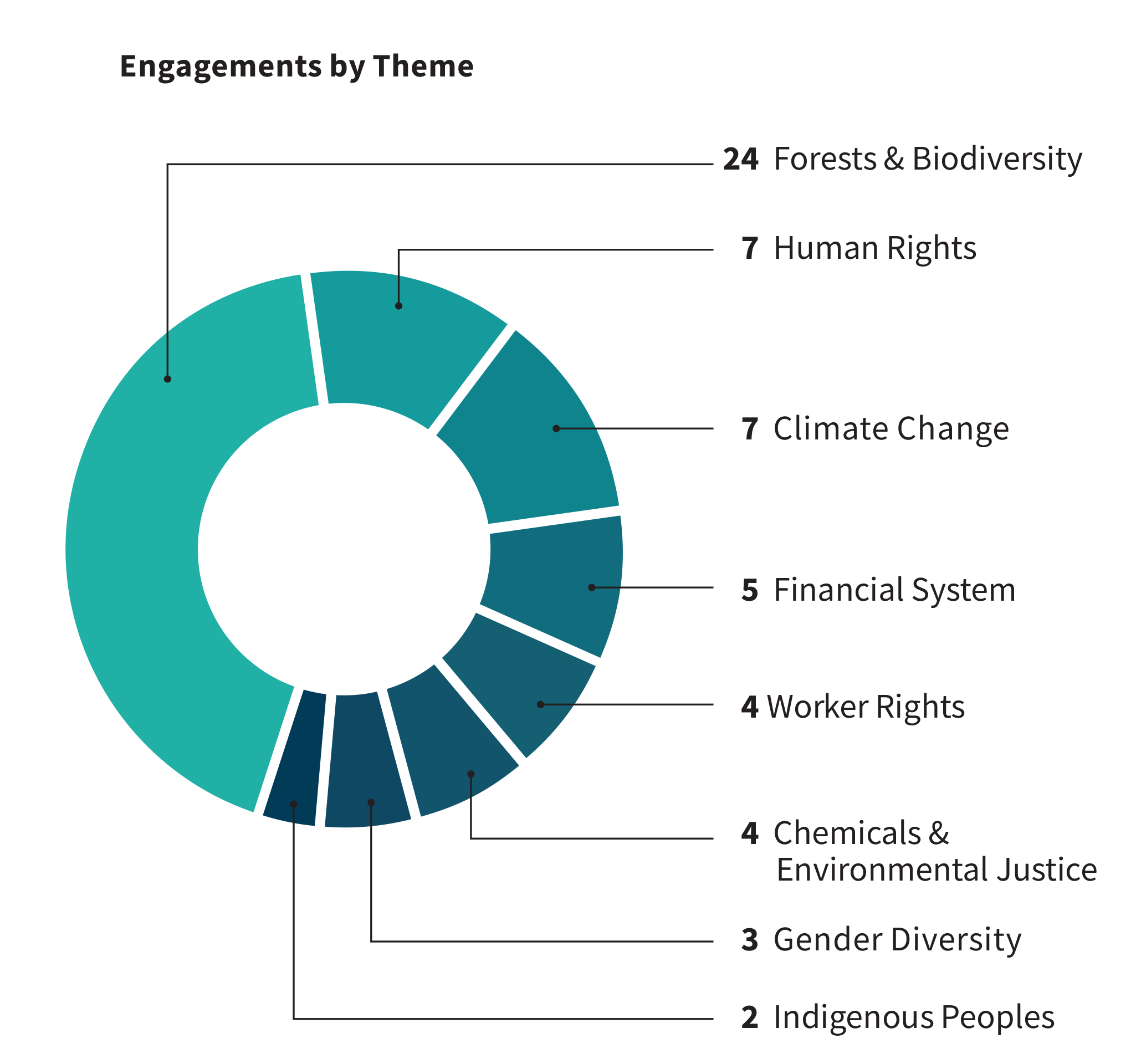
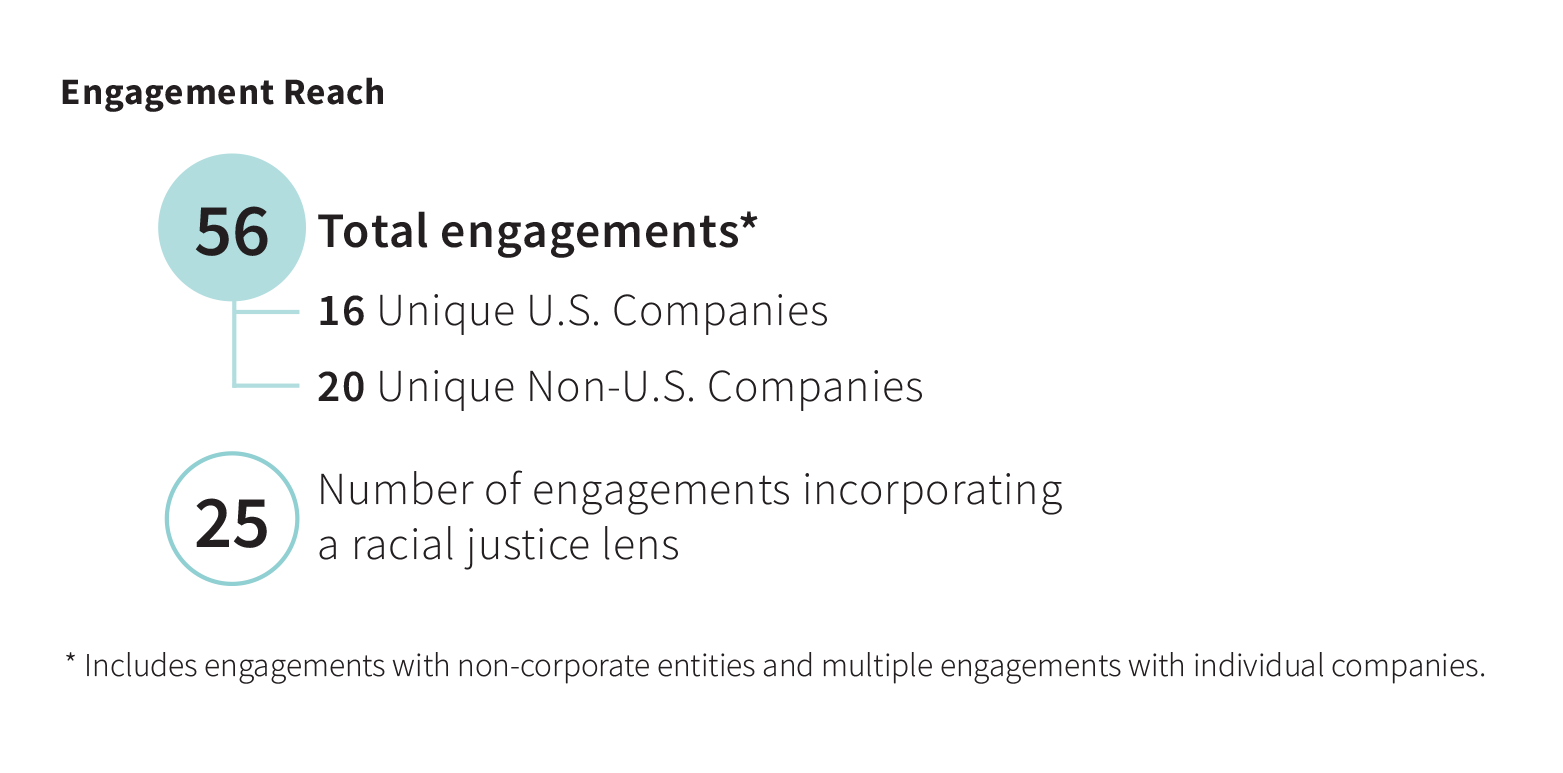

Low-Carbon Funds for a Low-Carbon Future
When you invest in the Domini’s equity strategies, you get global stock market exposure aligned with the transition to a sustainable, low-carbon future.
As of January 31, 2025, the Domini Impact Equity Fund, Domini Impact International Equity Fund, and Domini Sustainable Solutions Fund have all received Morningstar’s Low Carbon Designation™, which is assigned to portfolios that have low carbon risk scores and low levels of fossil fuel exposure. The designation is an indicator that the companies held in the Funds are in general alignment with the transition to a low-carbon economy.*
The Domini Funds
- Do not invest in fossil fuels like coal, oil and natural gas.
- Seek to avoid investments that contribute most heavily to climate change.
- Pursue investments that support climate change mitigation and adaptation.
- Engage with companies on behalf of shareholders to advocate for transition strategies aligned with a low-carbon future.
*Morningstar Portfolio Carbon Metrics are asset-weighted portfolio calculations based on Sustainalytics company carbon-risk research. In order to receive the Low Carbon Designation, a fund must have a Historical Carbon Risk Score below 10 and a Historical Fossil Fuel Percentage of Covered Portfolio Involved of less than 7%. As of 1/31/2025, the Domini Impact Equity Fund, Domini Impact International Equity Fund, and Domini Sustainable Solutions Fund had Portfolio Carbon Risk Scores of 3.82, 5.91, and 5.45, respectively, based on 99.26%, 98.15%, and 96.32%, respectively, of eligible portfolio covered.
Promoting Safer Alternatives to Hazardous Chemicals

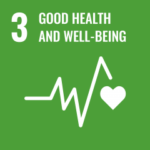

There is increasing recognition of the dangers that hazardous chemicals pose to human health and the environment. For example, there has been growing awareness that PFAS, a group of “forever chemicals” used in everyday products like food packaging and personal care products, can contaminate food and water supplies and pose long-term risks to human health. Through an engagement initiative informed by scientists at ChemSec, we are encouraging companies to remove toxic chemicals from their products and transition to safer alternatives to reduce risks.
Together with other investors, we have met with several companies in the chemicals industry, including specialty chemicals company Evonik Industries and paints and coatings companies PPG Industries and Sherwin-Williams. We initiated these engagements by asking more about the hazardous chemicals in their product portfolios to better understand the nature of the risks and challenges they face. We have encouraged them to disclose the production volumes and revenue shares for hazardous chemical products, as well as any products containing hazardous chemicals. As a next step, we are asking them to provide time-bound plans detailing how they will phase out these products. Such plans should include realistic road maps with clear KPIs to track progress. Finally, we are also encouraging these companies to develop safer solutions through investment and innovation and to set revenue targets for the sale of these safer alternatives.
Progress Achieved: Since we began our engagement, PPG has announced it will not add PFAS to any new products and has committed to fully phasing out the use of PFAS. This is an important step, and we will continue to encourage PPG to disclose details of its phase-out plan and progress toward developing alternatives. Read more about our approach to forever chemicals.
Investment Highlight: Domini Impact Equity Fund
Target Corp., the Minneapolis-based discount retailer known for its affordable prices and wide range of products, launched a comprehensive chemicals policy in 2017 as part of its ‘Target Forward’ sustainability strategy. The policy aims to drive transparency and proactive chemical management across both owned and national brand offerings, extending to the chemicals used throughout the company’s operations. Target utilizes hazard profiles to prioritize substances for restriction and Restricted Substance Lists (RSLs) to minimize and, where possible, remove prioritized chemicals from products and processes. A core component of the company’s strategy is its commitment to identifying and supporting initiatives to develop safer alternatives to chemicals of concern. Its ‘Target Clean’ program is designed to help shoppers find products that use safer alternatives, and as year-end 2023, it had increased the number of ‘Target Clean’ products by 10% year-over-year. Since 2017, Target has also invested in four new green chemistry research and innovation projects, and it has committed to removing PFAS from all of its owned product brands by 2025.
Reducing Nature and Biodiversity Impact in the Apparel Industry

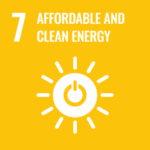
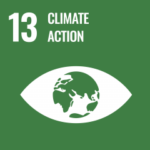
This quarter, as a member of the Finance for Biodiversity Foundation, we engaged with several companies in the global apparel sector to address their impacts on nature and biodiversity, including with Japan’s Fast Retailing (owner of Uniqlo), Spain’s Industria de Diseño Textil or “Inditex” (owner of Zara), and Germany’s Adidas. The textile and apparel industry’s impact on nature starts with raw materials—from the use of land to grow natural fibers like cotton and linen, to the processing of man-made cellulose fibers derived from wood pulp like rayon, to the production of entirely synthetic petroleum-based fibers like nylon. The production process for many fibers requires large amounts of water and energy and produces significant emissions. Hazardous chemicals used in dyeing and finishing fabrics also contribute to water and soil pollution. Apparel made with synthetic fabrics also releases harmful microplastics throughout its life cycle during washing, drying, and even just wearing, with further questions around end-of-life reuse, recycling, and disposal.
In light of these challenges, we hope to better understand from the companies we are engaging how they assess and manage their nature impact. We hope to lift up best practices around supply chain policies and target-setting and to encourage collaboration across the textile value chain to minimize the industry’s adverse impact on biodiversity, particularly in sensitive locations. Responsible management of these issues is important both for the resilience of natural ecosystems and for human health. It can also help companies better prepare for and adapt to emerging regulations and better position them for opportunities to innovate and support the transition to a circular economy.
Investment Highlight: Domini Sustainable Solutions Fund
Based in San Francisco, California, Levi Strauss & Co. sells jeans and other apparel under well-known brands like Levi’s and Dockers. As part of the company’s broad sustainability strategy, it has set several goals aimed at preventing and reducing its impact on biodiversity within its supply chain, while supporting ecosystem protection and restoration programs. To achieve this goal, the company committed to three projects that consider and prioritize the parts of nature the company depends on and can pose a business risk. To start, Levi has committed to investing in at least three projects in high water-stressed basins to reduce freshwater withdrawal and nutrient load pressures in its raw material supply chain by 2030. It has also pledged to achieve zero deforestation across high-risk materials by the end of 2025 and to protect and restore 30% of its raw material footprint in regions of significant biodiversity by 2030, equating to roughly 50,000 hectares.
Halting Commodity-Driven Deforestation

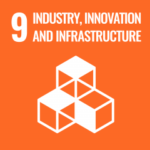
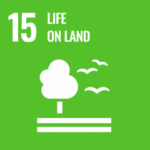
Approximately 40% of global deforestation is driven by clearing land to produce commodities, including soy, palm oil, and beef. In recent meetings with two British grocery retailers, Marks & Spencer and Sainsbury’s, we were encouraged by their strong commitments to integrating sustainability into their business models. While some of this is due to anticipated regulatory requirements, including the European Union’s new Regulation on Deforestation-free products, both companies are going beyond. They have undertaken initiatives to increase traceability of commodities down to the ground level, which will provide more assurance that commodities in their supply chains are not being produced in deforested areas. The companies spoke about efforts to better link their climate, nature, and human rights strategies, as well as some industry-wide collaborations. Much of the work will involve transforming incentives for farmers, so we were encouraged by their programs to partner with suppliers and leverage technology to help advance their work and to bring smallholder farmers along in the transition to more responsibly produced commodities.
Investment Highlight: Domini Impact Equity Fund
In 2014, French cosmetics and personal care company L’Oréal S.A. launched its first zero deforestation policy, and in 2020 it reaffirmed its ambition to protect forests and biodiversity as part of its L’Oréal for the Future sustainability program. This program includes a number of ambitious commitments, including ensuring that, by 2030 at the latest, “100% of the biobased ingredients in its formulas and biobased materials for packaging will be traceable to the point of origin and derived from sustainable sources, with no link to deforestation nor any form of human rights violations.” It also includes commitments around optimizing use of forest-related raw materials (including palm, soy, and wood-based ingredients) and actively supporting conservation and reforestation both within its supply chains and beyond. To guide this work, L’Oréal introduced a 2030 Forest Policy, which defines a roadmap with specific measures to track progress on traceability and supplier engagement, forest restoration, and broader, systemic change. Importantly, L’Oréal recognizes the crucial link between forest systems and biodiversity, and its commitments include the L’Oréal Fund for Nature Regeneration, a €50 million impact investing fund to support biodiversity conservation and restoration, and which aims to restore one million hectares of degraded ecosystems by 2030.
European Innovation in Sustainable Transition Financing

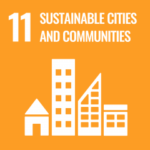

Green- and sustainability-linked bonds can provide targeted capital to encourage and incentivize the transition to more sustainable practices. This often includes incentives and more favorable pricing when a set of practices meets certain sustainability characteristics. We recently met with Groupe BPCE, France’s second largest banking group, to understand how it provides financing that can support sustainability in agriculture.
As the first European bank to issue a green bond dedicated to sustainable agriculture, providing capital specifically to help farmers transition to more sustainable practices, BPCE is demonstrating how financiers can adapt products to help clients meet evolving challenges. For example, it has also issued green bonds to provide access to capital for renewable energy and energy efficiency projects. In our conversation, BPCE shared details about its ability to work closely with farmers and communities given its cooperative structure, which enables it to be more responsive to the needs of local stakeholders and to give back to its communities. We encouraged the bank to continue enhancing disclosure on its transition strategy, the impact of the proceeds from these bond issuances, and details broadly about its work to support the sustainable transition in agriculture and beyond.
Investment Highlight: Domini Impact Bond Fund
The Domini Impact Bond Fund owns a green bond issued by ING Groep N.V., the Netherlands-based multinational banking and financial services company. ING issued its first green bond in 2015 and established its first Green Bond Framework for financing sustainable assets and projects aligned with the UN Sustainable Development Goals and the firm’s sustainability strategy. In 2024, ING updated this framework to its Global Green Funding Framework, aimed at financing or refinancing green assets. Eligible projects include renewable energy, green buildings, clean transportation, pollution prevention and control, and sustainable water management, including clean drinking water and flooding mitigation systems. As of the end of 2023, ING’s green loan portfolio included almost €42 billion in financing for green residential buildings in the Netherlands and Germany, over €4 billion in financing for green commercial buildings in the Netherlands, and over €6 billion in financing for wind and solar projects globally.
Domini Impact Bond Fund Theme Allocations*

*Based on portfolio holdings as of 3/31/2025, excluding cash & cash equivalents, cash offsets, futures, swaps and options with the exception of short-term U.S. Agency bonds, which are reflected in this reporting. Numbers may not sum to 100% due to rounding. The composition of the Fund’s portfolio is subject to change. Visit domini.com to view the most a list of the Fund’s holdings.
Moving Beyond Forever Chemicals
By Lionella Pezza, Director of Impact Research and Mary Beth Gallagher, Director of Engagement

Everyone deserves clean air and water, free of harmful toxins. The United Nations (UN) recognized this in 2022 with a resolution declaring that access to a clean, healthy, and sustainable environment is a universal human right.
Since then, we have witnessed growing awareness and concern over the serious health and environmental risks posed by chemicals found in many everyday products. Per- and polyfluoroalkyl substances, more commonly known as PFAS or “forever chemicals,” are commonly used in products like non-stick cookware, paints, cosmetics, raincoats, firefighting foam, and much more. These chemicals do not break down, persisting in the environment and the human body, and exposure has been linked to a number of health problems, including certain cancers, infertility, and obesity.
Even many chemicals once thought to be safe have now been found to be hazardous to people and the environment. For instance, a recent study revealed that certain polymers used as flame retardants, once thought too large to migrate from products into the human body, can actually degrade into smaller toxic particles. Scientists detected these smaller molecules in soil, air, and dust, where they can be easily absorbed by humans and wildlife and cause serious health problems. Testing in zebrafish showed a potential link to mitochondrial dysfunction and developmental and cardiovascular harm.
In light of these risks, governments are taking action. Last year, the US Environmental Protection Agency (EPA) took steps to remove PFAS from drinking water, while the European Union (EU) is currently seeking to ban the use of PFAS in consumer products. The EU also recently tightened its air quality standards, cutting the allowed annual limit value for fine particulate matter, the main air pollutant, by more than half.
The private sector also has an important role to play. At Domini, we have always sought to invest in companies that take a proactive and thoughtful approach to chemical management and pollution control. We have generally avoided investment in major producers of synthetic pesticides and agricultural chemicals, and in our research we positively consider company initiatives to reduce the use of toxic chemicals in favor of safer alternatives, such as non-petrochemical feedstocks.
Because of the persistence of forever chemicals, it is essential that significant efforts be made to phase out their use as quickly as possible, and we actively seek to invest in companies with proven commitments. Many companies are beginning to transition their use of such chemicals due in part to regulation and litigation risks, but also because of growing demand from their customers and investors to find safer, more sustainable alternatives. Frameworks like the Portfolio Sustainability Assessment (PSA), developed by the World Business Council for Sustainable Development, can help companies evaluate their product portfolios, develop sustainable transition strategies, and communicate progress to stakeholders.
Still, further clarity is often needed to more effectively evaluate how companies transitioning their use of toxic chemicals assess and define the “sustainability” of alternatives. Through engagements as part of the Investor Initiative on Hazardous Chemicals, supported by ChemSec, we encourage companies to provide greater transparency; we seek disclosure of the percentage of sales or products that include hazardous chemicals, whether they have commitments or targets to phase out usage of hazardous chemicals, and details on efforts to invest in non-toxic, sustainable alternatives. We also encourage collaboration between suppliers, manufacturers, which can allow companies to better respond to consumer demands and help industries move forward on a clear pathway together.
In some industries, alternatives for hazardous chemicals have already been identified, so the transition will be easier. In others, it will be more challenging. Many products rely on toxic chemicals that provide unique characteristics—such as water resistance, strong adhesiveness, or the ability to withstand wear and tear—and these may be harder to substitute. Some companies may also face longer regulatory approval timelines for changing their production processes. Greater clarity on these challenges can help stakeholders better understand the risks and priorities for companies’ transition strategies. We will keep encouraging companies in the Domini Funds to evaluate their use of forever chemicals and communicate transparently, so that we can continue to support their phase out and ensure a cleaner, safer future for people and the planet.
Taking Responsibility for a Just Transition

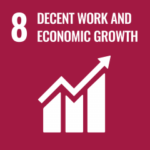

In February, Domini’s Director of Engagement, Mary Beth Gallagher, participated in an event hosted by the University of Connecticut’s Business and Human Rights Initiative, which brought together students, academics, investors, and business professionals for an informative dialogue centered on how investors can support a fair and just climate transition. Mary Beth shared examples from our engagements with companies in the automotive, manufacturing, and agriculture sectors. We encourage companies to develop transition strategies focused on equitable access, affordability, and opportunities to uplift historically underserved communities. This approach can help companies minimize resistance from concerned parties, such as workers worried about being dislocated. It can also reduce the likelihood of controversies and labor disruptions, help ensure the availability of a skilled workforce, and prevent companies from losing the social license to operate in affected communities. The next day, we also participated in a workshop with researchers and human rights experts from around the world who shared insights from their research on emerging just transition topics. These exchanges help to deepen our understanding of the issues affecting companies and communities, helping inform our dialogues and shaping expectations for a fair and just transition.
Investment Highlight: Domini Impact Equity Fund and Domini International Equity Fund
Siemens AG, a German multinational industrial technology company, is working to make sure that no one is left behind in the transition to a more sustainable economy. According to the company, 46% of today’s jobs will change significantly by 2030, with a resulting shortage of over 5 million skilled workers in the German labor market alone. To help confront this challenge, in 2022, Siemens launched the SiTecSkills Academy, a continuing education academy focused on technical upskilling and reskilling. At 18 regional training centers across Germany, SiTecSkills provides technical training and qualification programs in areas of digitalization and sustainability for employees working in manufacturing, service, sales, finance, controlling and business support. It also provides tailored consulting services for businesses to help ensure their workers have the skills needed to keep pace with the transition. 11,928 workers participated in the SiTecSkills Academy in 2024, with 99.7% of them completing their training.
Domini News
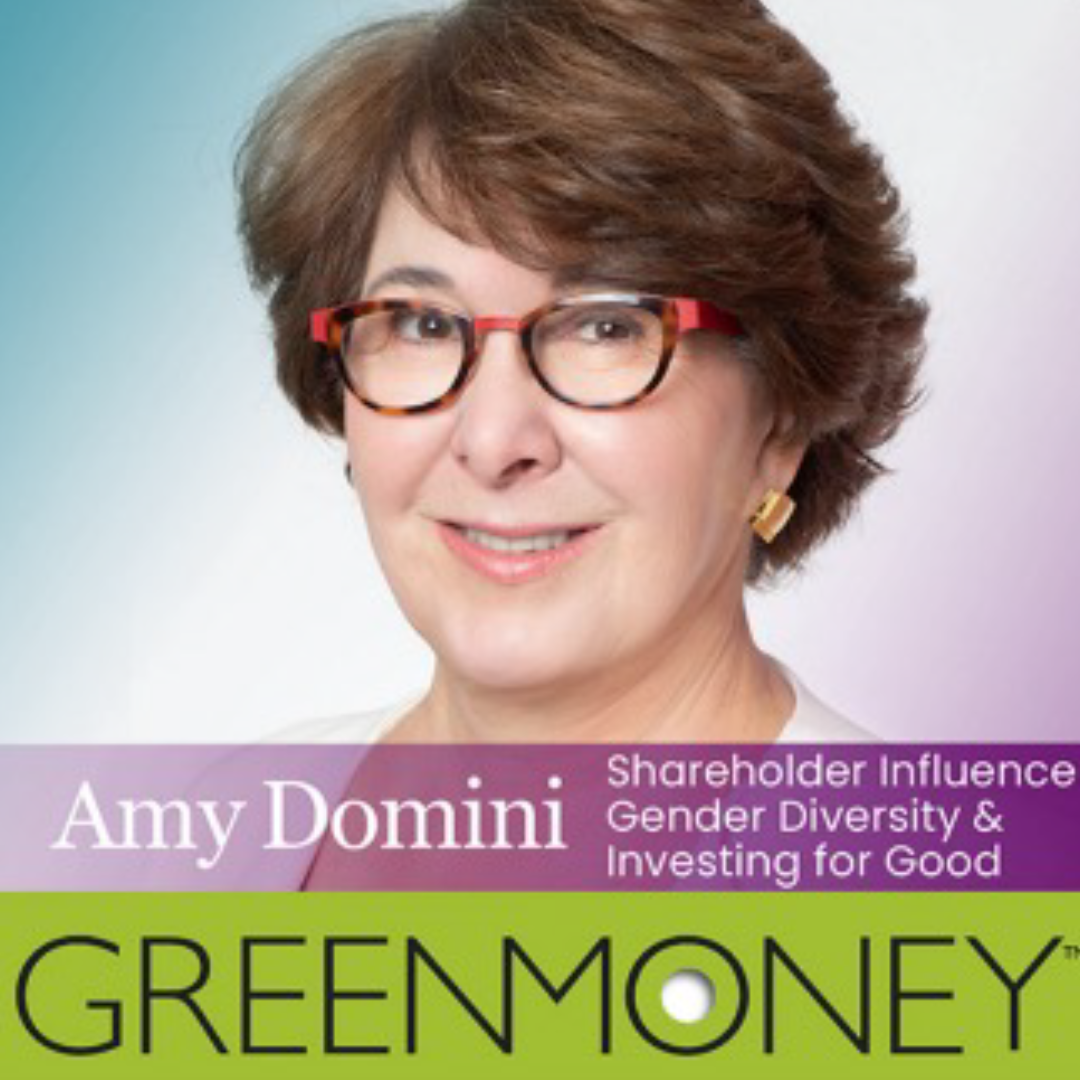
Amy Domini Talks Investing for Good® on GreenMoney Talks Podcast
In a new two-part podcast series from GreenMoney Talks, Domini’s Founder, Amy Domini, shares inspiring stories and insights from her decades as a leader and innovator in the field of impact investing. She recalls the industry’s early ties to the boycott movement against Apartheid in South Africa, shares her experience advocating for gender diversity in the boardroom, and explains how using environmental and social indicators can lead investors to higher-quality management teams. She also highlights Domini’s efforts to combat climate change by protecting forests and biodiversity, and she shares her perspective on recent economic volatility and the state of markets. Listen now at GreenMoney.com or find GreenMoney Talks on Apple Podcasts or Spotify. Read more.

Highlights from Our Impact Research: Innovation in Tires
As we continue efforts to decarbonize the economy, ongoing investment in innovation will be needed across all industries. In our recent article, “Rolling Towards a More Sustainable Future,” we take a deep dive into how two companies are driving the development of more sustainable tire solutions. Their examples showcase how sustainability can be embedded across the value chain, even in traditionally carbon-intensive industries like tire manufacturing. It is more evidence of how investors and the companies they own can step up to lead the low-carbon transition. Check out the article.
Sustainable Development Goals
In the eight years since United Nations member states adopted the 2030 Agenda for Sustainable Development, the Sustainable Development Goals (SDGs) have been widely embraced by governments, civil society organizations, companies, and investors. The SDGs aim to address broad global topics such as poverty eradication, food security, protection of forests, sustainable cities and economic growth, gender equality, and climate change. Engagement highlights in this report are flagged with SDGs they are helping support. Learn more at domini.com/sdg

